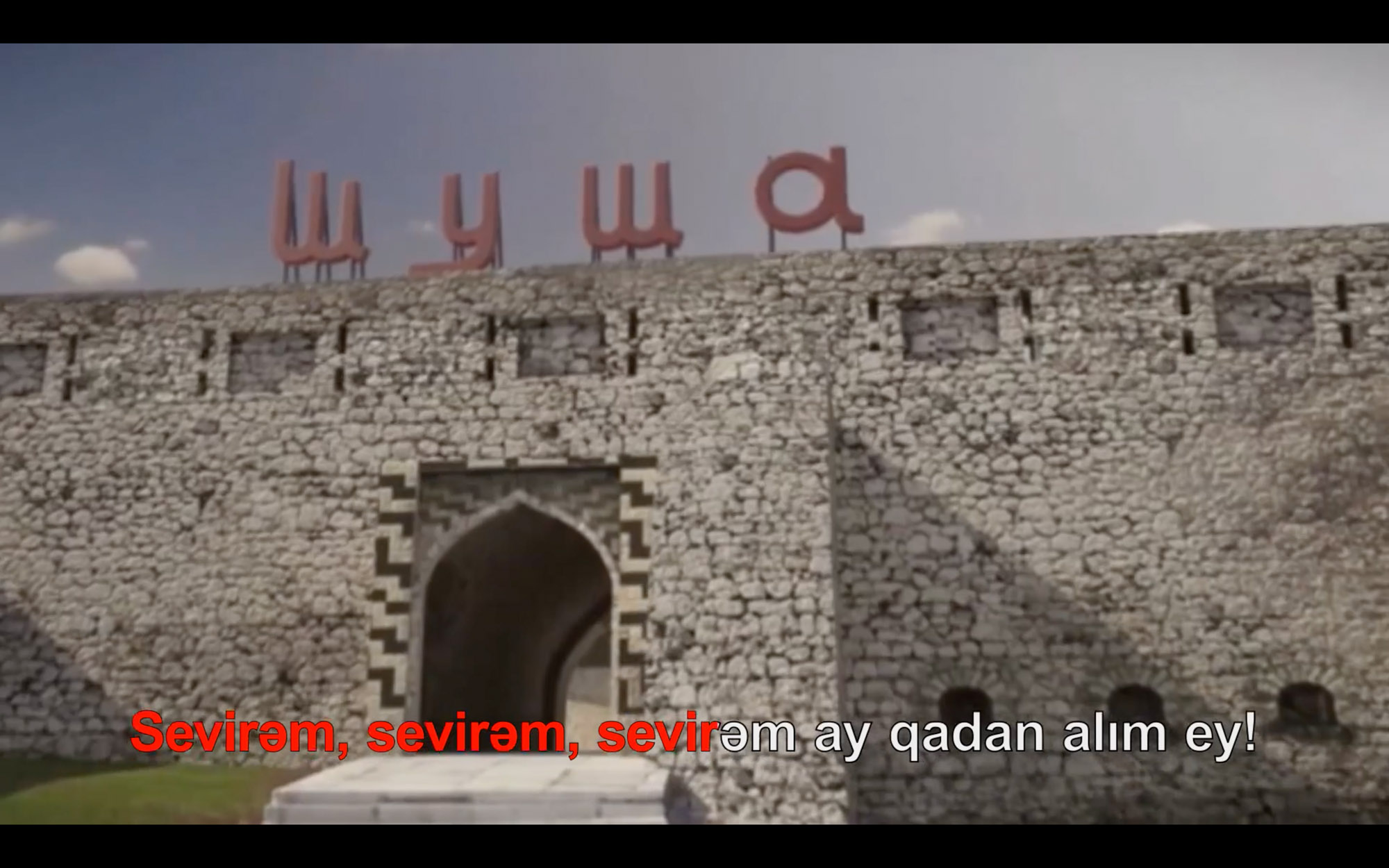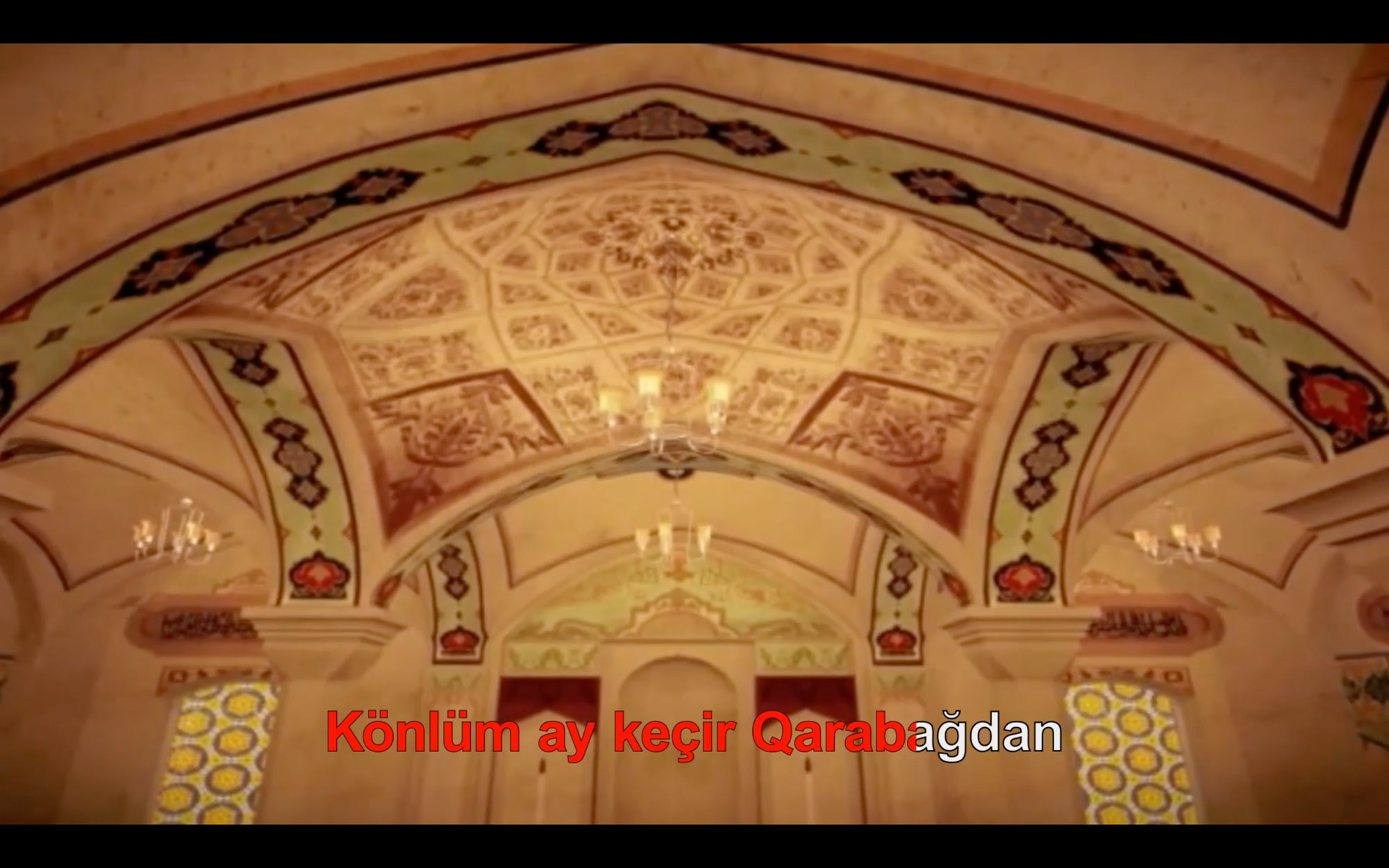Mugham-Karaoke | 2017 | DVD-Player with Karaoke-function, Micro, LCD/LED-screen
Mugham (Azerbaijan: Muğam, مقام) is one of the main genres of traditional Azerbaijan music, a compound vocal-instrumental composition of many parts. “Mugham” is also a common name of Azerbaijan musical modes. The melodies are typically transmitted in the course of improvisation based on a certain mugham-mode. Mugham is performed by a soloist (Azerbaijan: khananda, singer) accompanied by musicians who play the tar, the kemanchen and the daf. In 2008, UNESCO recognized mugham as a Masterpiece of Oral and Intangible Cultural Heritage of Humanity.
Since the 1930-s, mugham, along with the whole folk musical culture of the peoples of the USSR, was under the strictest control of the state. For years, the Azerbaijan national music was denied access to international scene. In public consciousness, mugham was forcedly associated with primitive art form. In 1970-s, however, the situation in the USSR changed, and small nationalities, the Azerbaijan included, had the opportunity to listen to and study their folklore and music. In Azerbaijan, the mass production of mugham sound recordings started. Nowadays mugham is more than just traditional music, it is a kind of “background” of constant presence in Azerbaijan. The state actively supports the maintenance and development of mugham in all directions. The Folk Faculty at the Baku Academy of Music became a separate institution under the name of Azerbaijan State Conservatoire. The mugham music can be heard practically everywhere, from public transport to local TV channels. Summing up, the traditional music in Azerbaijan is not a survival of times past, but the mainstream in every sense of the term.
Created by Japanese engineers, karaoke (the term compound of Japanese kara – “empty” and ōkesutora – “orchestra”) got widespread mostly among the Asian countries, turning into a cult in such as Japan, China, South Korea, the Philippines, Cambodia and others, and gained much popularity on other continents as well. Travelling around the world, especially in Europe, never did I come across so many karaoke bars and clubs as in the post-Soviet space. In comparison with the centre of Vienna, the centre of Baku has twice as many karaoke bars and clubs. Within 1.5 km of my flat in Baku, more than 20 places with the karaoke machine can be found (as of 2016). The point is that the “Soviet” person, after the long years of communist regime, comes to a restaurant/bar/club and wants to get it all and at once. In order not to lose their clients, the local establishments try to adopt all the most fashionable and popular, which causes this abundance of karaoke machines in the most diversified entertainment establishments in the city. This is exactly why this big amount of karaoke-places does not appear surprising. The demand generated a lighter form of tradition.
“Mugham-Karaoke” is a project that mingles the traditional centuries-old musical style with karaoke machine. The final product is a utopia, as mugham, despite the certain set of rules, is an improvisation in its way. Besides, mugham is performed in Azerbaijan, which makes its vocal reproduction complicated and practically impossible for non-native speakers.
Since the 1930-s, mugham, along with the whole folk musical culture of the peoples of the USSR, was under the strictest control of the state. For years, the Azerbaijan national music was denied access to international scene. In public consciousness, mugham was forcedly associated with primitive art form. In 1970-s, however, the situation in the USSR changed, and small nationalities, the Azerbaijan included, had the opportunity to listen to and study their folklore and music. In Azerbaijan, the mass production of mugham sound recordings started. Nowadays mugham is more than just traditional music, it is a kind of “background” of constant presence in Azerbaijan. The state actively supports the maintenance and development of mugham in all directions. The Folk Faculty at the Baku Academy of Music became a separate institution under the name of Azerbaijan State Conservatoire. The mugham music can be heard practically everywhere, from public transport to local TV channels. Summing up, the traditional music in Azerbaijan is not a survival of times past, but the mainstream in every sense of the term.
Created by Japanese engineers, karaoke (the term compound of Japanese kara – “empty” and ōkesutora – “orchestra”) got widespread mostly among the Asian countries, turning into a cult in such as Japan, China, South Korea, the Philippines, Cambodia and others, and gained much popularity on other continents as well. Travelling around the world, especially in Europe, never did I come across so many karaoke bars and clubs as in the post-Soviet space. In comparison with the centre of Vienna, the centre of Baku has twice as many karaoke bars and clubs. Within 1.5 km of my flat in Baku, more than 20 places with the karaoke machine can be found (as of 2016). The point is that the “Soviet” person, after the long years of communist regime, comes to a restaurant/bar/club and wants to get it all and at once. In order not to lose their clients, the local establishments try to adopt all the most fashionable and popular, which causes this abundance of karaoke machines in the most diversified entertainment establishments in the city. This is exactly why this big amount of karaoke-places does not appear surprising. The demand generated a lighter form of tradition.
“Mugham-Karaoke” is a project that mingles the traditional centuries-old musical style with karaoke machine. The final product is a utopia, as mugham, despite the certain set of rules, is an improvisation in its way. Besides, mugham is performed in Azerbaijan, which makes its vocal reproduction complicated and practically impossible for non-native speakers.



